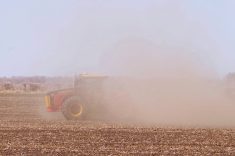Uncertainty remains a key component in several of the federal minister of agriculture’s files.
A little more than two years into her current role, Marie-Claude Bibeau has been unable to gain the provincial support needed to find a solution for Canada’s business risk management programs.
As she noted herself recently, it has been over 100 days since she proposed to provinces changes to AgriStability.
Earlier this year, Bibeau suggested dropping AgriStability’s maximum reference margin, and increasing the compensation rate from 70 to 80 per cent retroactively this year and for calendar 2021 and 2022.
Read Also

Farm equipment market unlikely to pick up
North America’s farm machinery sales have been slow and uncertain thanks to tariffs and trade disruption. There’s not a lot of hope for change in 2026.
That would mean the program offers producers a better chance of receiving support, and more money when they do; but it would come at an added cost to governments.
Bibeau should be commended for securing the dollars to improve the program.
Manitoba, Saskatchewan and Alberta continue to be reluctant to accept the offer.
Bibeau is willing to meet with the provinces again, but is expecting they come with a final decision on whether or not they will support the changes.
As she put it, “We have had many discussions, Canadian farmers want us to act.”
No date is set for that meeting, but its outcome could say a lot about Bibeau’s ministerial ability.
Failing to get changes will be a failure of government leadership.
Conservative provincial Prairie governments are responsible for refusing to do what farmers, Ottawa, other provinces and a multi-partisan federal committee are asking for.
As a federal minister, Bibeau still carries the burden of being the consensus finder amongst her provincial counterparts.
She shoulders part of the blame when consensus cannot be found.
Bibeau isn’t running solo in her efforts to get the unwilling provinces on board.
Jim Carr, who serves in the Liberal cabinet as a special representative for the Prairies, joined Bibeau in her recent press conference to support her message.
It isn’t entirely clear who within those provincial governments Carr is lobbying, but he said he has had conversations with members of each.
These are admirable efforts, but Bibeau’s inability to secure a deal means the future of the file is uncertain.
Uncertainty is a theme in another one of her major files, too: temporary foreign workers.
Bibeau can be excused here to a degree, because her priorities are taking a back seat to those found in other federal portfolios (health and safety trump farming). Plus, the actual administration of temporary foreign workers is done outside of AAFC.
Still, the need for international farm workers is a significant issue to Bibeau’s stakeholders.
One year into an ever-evolving pandemic, there is an opportunity for her to clear up the confusion.
An attempt to do just that was had March 16 when Bibeau had a press conference to let producers know temporary foreign workers arriving in Canada will no longer be totally exempt from mandatory hotel quarantines, while asymptomatic workers will still be able to quarantine on farm.
An attempt to clear up confusion came with unanswered questions.
For example, when announcing the changes, the federal government said supports would be offered to workers undertaking a quarantine, but Bibeau was unable to provide specifics.
Instead she said the government was “committed to making sure the sanitary measures won’t put additional financial burden on our employers or the workers” before admitting, “I still have a bit of work to do in terms of financial mechanism.”
It won’t be easy, but Bibeau must end the uncertainty.















